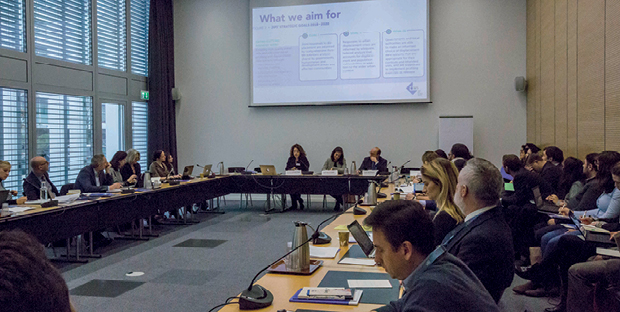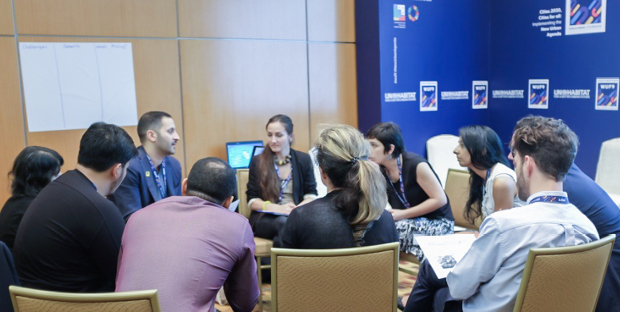Together with the Permanent Mission of Norway to the UN and other International Organisations in Geneva, as well as the Expert Group on Refugee and IDP Statistics (EGRIS), we organised an event to tackle the topic of “Improving statistics on forced displacement” from two different perspectives.
In this article we focus on the first part of the event highlighting JIPS’ work, including the launch of its new three-year strategy and key achievements in 2017. To find out more about the second part of the event, jump ahead to the article presenting the EGRIS and its work.

Joint event on ‘Improving statistics on forced displacement” (Feb 2018).
Our newly launched strategy marks a decade in our work supporting collaborative profiling exercises in displacement contexts worldwide. It was developed through an inclusive process involving both internal and external evaluations, extensive partner consultations and involvement from all JIPS Executive Committee members.
Reinforcing our efforts today, this new strategic blueprint stands for continuity and yet refined focus and innovation.
We have defined three goals that we see as particularly relevant in internal displacement contexts and where we believe JIPS has an added value: comprehensive analysis for durable solutions to displacement, tailored analysis in urban displacement contexts, and data capacities of national and local authorities. Importantly, JIPS’ whole mission integrates meaningful engagement with communities throughout its work.
Building on the IASC Framework on Durable Solutions for IDPs, we have been working with the Special Rapporteur on the Human Rights of IDPs as well as a broad range of partners to develop measurable indicators and thorough analysis guidance. The launch of both of these products is just around the corner, in March 2018, and will be integrated in our field support. We are also planning on elaborating relevant training modules and tools tailored to field practitioners, as well as work with government, humanitarian and development actors to enhance practices through implementation of the indicators and analysis recommendations.
Building on our extensive profiling experience and through our continued support in diverse urban contexts, we will work to develop sound methodological approaches and practical tools that look at both the people in the cities affected by displacement, and the urban systems themselves.
JIPS will work with partners to develop a practical toolkit for urban profiling and will continue its involvement with the Global Alliance for Urban Crises. It furthermore includes advocacy and sharing experiences, e.g. at the ninth World Urban Forum or the Crises in Cities and Cities in Crisis Conference 2017.

Networking event on ‘Displacement in cities’ at the ninth World Urban Forum, jointly organised by JIPS, the Global Alliance for Urban Crises, IMPACT Initiatives and the IRC.
Building on many years of experience working with national statistical offices and through our strong involvement in the EGRIS as lead of its IDP sub-group, we aim to expand our expertise to advise government partners on comprehensive IDP data management and continue to improve our direct support for profiling activities and improvement of the JIPS Essential Toolkit (JET).
This also covers fostering collaboration on data processes with humanitarian and development partners, as well as capitalising on existing and new partnerships, including with Statistics Norway and NORCAP. One concrete output is already underway, with the EGRIS Technical Report on Statistics on IDPs, to be adopted by the UN Statistical Commission (UNSC) in March 2018.
These goals, just like our day-to-day work, are not achieved in a vacuum: from an external point of view, we work within a wider community and aim to contribute through our efforts to improving practices both on displacement and data collection issues.
Much of what we do is achieved through cross-cutting activities relevant to each of the goals outlined above, including direct delivery of field support, development of practical tools and guidance, investment in capacity building and advocating for better and more agreed-upon displacement data. Through all this work we aim to ensure high quality standards and effective use of profiling processes and other displacement data systems to inform durable solutions to displacement.
As the Ambassador Hans Brattskar, Permanent Representative of Norway to the UN and other International Organisations in Geneva, mentioned in his opening remarks, the need for better and more comprehensive data on displacement is clear, but we don’t often get to talk about how to make this happen.
Norway has been committed to improving data on forced displacement for years, not only in terms of financial support to organisations such as IDMC and to initiatives like JIPS, but also in the form of expertise through the deployment of statisticians from Statistics Norway to work with partners such as JIPS, UNHCR, the EGRIS, as well as collaborations with other national statistical offices around the world.
Data is important for all types of decision-making – from operational response to policy development and implementation of long-term solutions – as well as to inform effective advocacy and prevention. Against this background, Martina Caterina, speaking on behalf of the UN Special Rapporteur on the Human Rights of IDPs and as a member of JIPS’ Executive Committee, particularly welcomed and valued the contribution of JIPS’s work to improving the quality of data on displacement.
In order to be successful to achieve our strategic goals, we rely on a number of ‘enablers of success’. This includes enhancing existing and fostering new strategic partnerships, including within the statistical and development communities; continuous learning from our own practices as well as experiences and expertise of our partners; and resource mobilisation and especially core funding to help effectively implement a range of long-term programme and advocacy goals, in addition to cover essential running costs and bridge funding gaps.
A couple of exciting concrete outputs are already in the pipeline – such as the Durable Solutions online library and the EGRIS Technical Report on Statistics on IDPs, as mentioned above – so stay in touch and watch out for our news!